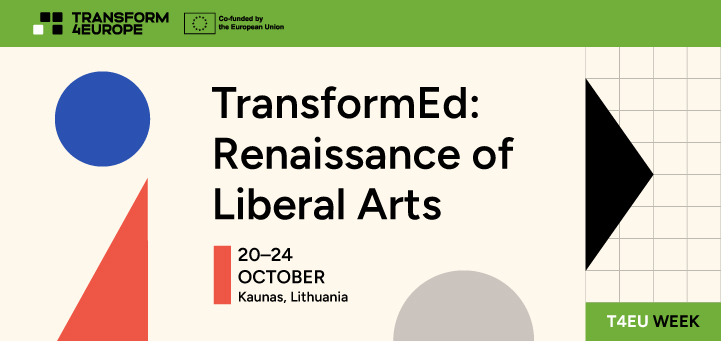T4EU week
TransformEd: Renaissance of Liberal Arts
Presented by
Vytautas Magnus University
ABOUT
WHEN? 20 – 24 OCTOBER 2025
WHERE? Kaunas, Lithuania
MAIN THEMES are related to the main areas of activity:
- KNOWLEDGE entrepreneurship
- ENVIRONMENTAL transformation
- DIGITAL transformation
- SOCIETAL transformation
VARIOUS STREAMS OFFERED
- STUDENT stream
- PhD stream
- MANAGEMENT stream
- RECREATIONAL, CULTURAL & SOCIAL stream
ACTIVITIES
- Explore the full schedule of activities
dedicated to students: click here (pdf, 132 KB). - Explore the full schedule of activities
dedicated to staff: click here (pdf, 140 KB).
CONCEPT NOTE
Imagine a university not just as a place to get answers, but as a place to ask more thoughtful questions. A space where we grow not only in what we know but also in who we are.
Vytautas Magnus University was founded on the idea of Liberal Arts as a comprehensive, cross-border, and value-driven model of education — a way of learning that emphasises freedom of thought, interdisciplinary openness, and intellectual responsibility. In a world that urges us to specialise, rush, and refine, the Liberal Arts dare to pause. To look inward and backwards — not to romanticise the past, but to recover the tools we need to live wisely and act justly.
The idea of a renaissance — a rebirth — is both a historical reference and a contemporary necessity. In an era shaped by rapid technological shifts, global uncertainty, and cultural fragmentation, we return to the enduring foundations of Liberal Arts — not relics of another age, but instruments for the future: critical inquiry, civic responsibility, philosophical reflection, artistic expression, and the capacity to connect disciplines, contexts, and communities.
The Liberal Arts tradition began with a simple yet radical question: What does it mean to be free? Not merely in the political sense, but intellectually, morally and imaginatively. This model of education invites students to engage with difficult texts and uncomfortable questions; to trace how language, culture, power, and knowledge intertwine; and to develop the capacity to interpret, to challenge and to create.
Over the course of five days, participants will explore subjects at the intersection of knowledge and care, tradition and innovation. There will be no final exams. The true outcome of this week will be measured in the depth of the questions we carry home:
- MAKING SENSE OF DISAGREEMENT. How can we learn to disagree meaningfully in a time of polarisation, disinformation, and digital toxicity?
- THE IDEA OF EUROPE. Is Europe a place, a project, or a shared imagination — and what does it mean to belong to it today?
- CRITICAL HERITAGE. Whose memory is preserved — and whose is silenced? How can we approach heritage in times of cultural conflict?
- GLOBALIZATION AND INTERNATIONAL COMMUNICATION. How can we think and communicate globally in an era of nationalism, disinformation, and digital fragmentation?
- FIELD NOTES TO FRONTLINES: ANTHROPOLOGY THAT MATTERS.
What does it mean to listen ethically, speak responsibly, and represent others with care in anthropology and beyond? - CREATING A MUSICAL FROM SCRATCH: INTERNATIONAL MUSICAL THEATER WORKSHOP. Can creativity across cultures become a language of shared meaning — and what can a musical say that words cannot?
- GIS 360°: MAPS THAT TRANSFORM SOCIETY. How can maps become instruments of social justice, environmental change, and collective storytelling?
- BIODIVERSITY CONSERVATION: UNDERSTANDING, THREATS & SOLUTIONS Can we protect biodiversity not only through science, but through empathy and civic responsibility?
- CLIMATE CHANGE SCIENCE AND SOLUTIONS. What does climate action mean in a world of complexity — and how can science, policy, and ethics work together?
To study the Liberal Arts is to walk into the unfinished story of humanity—with curiosity, courage and care. Let this be a week to read deeply, think critically and disagree intelligently.

STUDENT STREAM
We prepared 9 courses from which you can choose.
- Each student participates in 1 course, which will run the whole week, but during the application process you can rank 3 courses that you would like to attend in order of desirability.
- For each course, there will be an in-person component and an online component. The in-person component will take place during the T4EU week, whereas the online component will happen before the week. The exact information will be sent from the course leaders after the selection process is completed.
- To complete the course, you will have to pass a knowledge test. After successful completion you will be awarded 3 – 4 ECTS by the Vytautas Magnus University.
- The courses will mainly take place in the morning. In the afternoon, we will organise optional events, such as sports, cultural and scientific events.
The selection process is done by your home university. Please see the section “APPLICATION” below for more details and contacts.
For all courses:
- Course language: English
- ECTS: 3 – 4
- MIN. participants: 10
PhD stream
- Each student participates at 1 course, which will run the whole week, but during the application process you can rank 3 courses that you would like to attend in order of desirability.
- The maximum number of PhD students per university per course is 3.
- Each course has a maximum number of attendees. This is implemented to provide quality content in every course.
- The minimum number of attendees per course is 10. If the minimum number is not reached, the course will not be carried out, which will be known as soon as we get all the applications.
- PhD students will additionally have separate events to present their work and study field, like Science Slam, mixers and other activities.
MANAGEMENT & RESEARCH STREAM
- In this stream, the participants are representatives involved in different work packages, tasks or virtual offices, representatives in the Student Council and researchers coming for meetings.
- The programme for the administrative & research stream will be published separately.
RECREATIONAL, CULTURAL & SOCIAL stream
- In this stream the organisers will provide different extracurricular activities such as various sport activities, well-being, culinary and other types of workshops and excursions, etc.
APPLICATION
- All the application processes are done internally by each university individually.
- For more information about the selection process, please contact your university (you will find the contacts at the bottom of the page).
- For more information, please contact your local T4EU Office.
LOGISTICS & ACCOMMODATION
T4EU week events
T4EU Strategic Policy Conference
Universities Shaping the Future: Building Resilient Societies through Innovation and...
Read MoreT4EU Strategic Assembly and Policy Conference
Universities Shaping the Future: Building Resilient Societies Through Innovation and...
Read More

